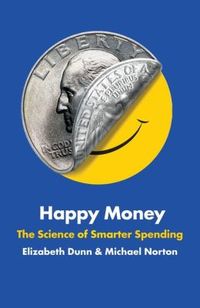

Purchase
The Science of Smarter Spending
Simon & Schuster
May 2013
On Sale: May 14, 2013
224 pages
ISBN: 1451665067
EAN: 9781451665062
Kindle: B008J4L17K
Hardcover / e-Book
Add to Wish List
Non-Fiction
If you think money can’t buy happiness, you’re not
spending it right. Two rising stars in behavioral science
explain how money can buy happiness—if you follow five core
principles of smarter spending.
Happy Money
offers a tour of new research on the science of
spending. Most people recognize that they need professional
advice on how to earn, save, and invest their money. When it
comes to spending that money, most people just follow their
intuitions. But scientific research shows that those
intuitions are often wrong.
Happy Money
explains why you can get more happiness for your money
by following five principles, from choosing experiences over
stuff to spending money on others. And the five principles
can be used not only by individuals but by companies seeking
to create happier employees and provide “happier products”
to their customers. Elizabeth Dunn and Michael Norton show
how companies from Google to Pepsi to Crate & Barrel
have put these ideas into action.
Along the way, the
authors describe new research that reveals that luxury cars
often provide no more pleasure than economy models, that
commercials can actually enhance the enjoyment of watching
television, and that residents of many cities frequently
miss out on inexpensive pleasures in their hometowns. By the
end of this book, readers will ask themselves one simple
question whenever they reach for their wallets: Am I getting
the biggest happiness bang for my buck?
Comments
No comments posted.
Registered users may leave comments.
Log in or register now!
| 


 © 2003-2025 off-the-edge.net
all rights reserved Privacy Policy
© 2003-2025 off-the-edge.net
all rights reserved Privacy Policy